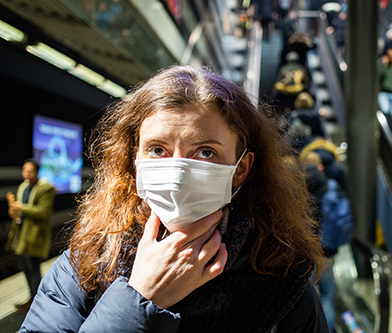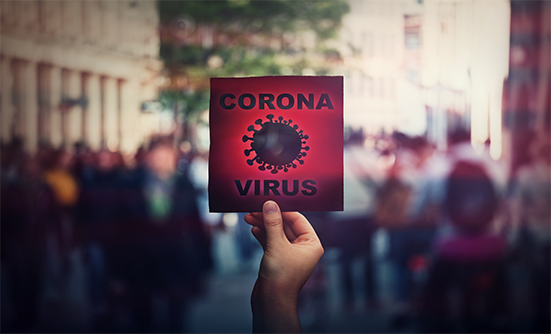As of March 4, 2020, more than 93,000 people in 77 countries have been infected with the coronavirus and there have been more than 3,199 related deaths, with most of them occurring in China. For people in most other parts of the world outside of China, your risk of getting COVID-19—the disease caused by the coronavirus—is currently low. However, it’s important to be aware of the situation. The potential public health threat posed by COVID-19 is high, both globally and to the United States.
CONQUER asked national cancer expert Lillie D. Shockney, RN, BS, MAS, HON-ONN-CG, for her take on emerging questions related to patients with cancer and the coronavirus.
Q: How concerned should a person with cancer be about coronavirus?
As is the case for all persons with cancer at any time, they need to stay clear of people who have any type of communicable infection, such as a cold or the flu. Currently, very few people in the United States have been diagnosed with the coronavirus, but that is likely to change. If a friend or a family member has traveled overseas in the past 4 weeks, it would be wise to avoid seeing them in person for at least a month, just to be safe.
Q: Are patients with cancer at a special risk?
They are, because their immune system is already taxed trying to fight the cancer. Also, their white blood count, particularly while receiving chemotherapy and/or immunotherapy, is not able to fight bacteria and viruses the way it would have been before a cancer diagnosis. Staying away from crowds, people who have traveled overseas in the past month, young children with a cold or flu symptoms, anyone with a fever, and those who say they are not feeling well, is a good way to reduce the risk of exposure to this virus.
Q: Are some patients more at risk based on their cancer type (for example, patients with lung cancer)?
Although patients with lung cancer are probably at increased risk, any patient with cancer who is receiving active treatment should be taking risk-reduction measures. All patients with advanced metastatic cancer are at greatest risk of having an infection, and infection often is the primary cause of death in patients with metastatic cancer.

Q: What can someone with cancer do to protect against the coronavirus?
The most important thing people can do applies to everyone: wash your hands frequently and carry hand sanitizer with you, especially when you are not near a clean bathroom.
Wearing a mask when in a crowd (and making sure it is covering your mouth and your nose) is wise. There are different types of face masks. One style is a respirator mask that will prevent airborne particles from entering your body. It is white, and it looks like a large cup. These masks are considered better than the regular blue (or white) masks that you see most frequently in an operating room or a dental office. However, there is a growing shortage of masks due to the fear of the coronavirus, so see if you can get several of them from your oncologist’s office—they likely will have a supply for their patients now.
If you don’t have to travel on an airplane, train, or bus, then don’t. If you must travel, keep your mask on the entire time. Many people take subways for their transportation to work or even to the cancer facility where they are getting their treatments. It is very important to wear a mask in such a setting—from the time they arrive at the subway entrance until they are outside again.
Q: What are the symptoms of the coronavirus, and when should a person with cancer seek medical help?
The symptoms begin like most flu or cold symptoms do. This virus causes a notably high fever. That is probably the biggest sign that the person needs to be examined by a doctor to determine what the illness is.
Although scientists are working to create a vaccine to prevent people from contracting this virus, it will likely take a year or more before it is available for use. Experts also hope that as the weather warms up, the virus may become less of an issue. Although an individual’s risk of contracting the disease is very low, by following these suggestions, patients with cancer may be able to protect themselves from it, along with preventing other airborne illnesses.
Tips for Staying Well
- Wash your hands often, for at least 20 seconds—between your fingers, under the fingernails, and the backs of the hands with hot soapy water or hand sanitizer—and ensure those around you do the same
- Avoid touching your face—eyes, nose, and mouth are prime opportunities for viruses
- Make sure that you, and the people around you, follow good respiratory hygiene. Cover your mouth and nose with your bent elbow or a tissue when you cough or sneeze, and dispose of the used tissue immediately
- Move away (at least 3 feet) from anyone who is coughing or sneezing
- Use a mask in crowded public spaces
- Avoid travel to Japan, Italy, Iran, South Korea, and China (and other countries as advised by public health officials)
- Keep a 30-day supply of essential medicines
- Get a flu shot, after getting your oncologist’s okay
- Have household items on hand
- Have a support system in place for family members with cancer
- If you have fever, cough, and/or difficulty breathing, seek medical advice promptly. Call your healthcare provider or facility in advance
Additional Resources for Coronavirus Information
Keep informed by following your local news sources and consult the websites below for accurate and timely information about the virus, COVID-19, and containment measures.
The National Institutes of Health is part of the US Department of Health and Human Services and is the nation’s medical research agency. Visit their website for information prepared for patients with cancer and coronavirus.
- The Centers for Disease Control and Prevention (CDC) is the leading national public health institute of the United States. The CDC is a US agency under the US Department of Health and Human Services www.cdc.gov/coronavirus/2019-nCoV/summary.html
- Your local public health authorities and official state website
- And for global news, the World Health Organization https://www.who.int/docs/default-source/coronaviruse/situation-reports/20200301-sitrep-41-covid-19.pdf
For more information as it pertains to people with cancer and survivors the website below offers expert opinion and has created this resource that deals specifically with cancer and the coronavirus:
American Society of Clinical Oncology “Coronavirus 2019: What People with Cancer Need to Know”
www.cancer.net/blog/2020-03/coronavirus-2019-what-people-with-cancer-need-know














